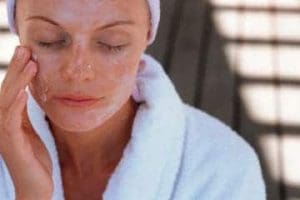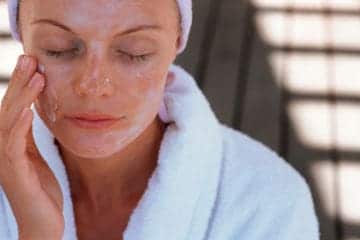 When it comes to your skin’s sun sensitivity, the right nutrients and vitamins can really make a big difference. With summer just around the corner, it’s officially outdoors season. That means sand, sun, vacations and, if you’re not careful, skin damage.
When it comes to your skin’s sun sensitivity, the right nutrients and vitamins can really make a big difference. With summer just around the corner, it’s officially outdoors season. That means sand, sun, vacations and, if you’re not careful, skin damage.
Talk about a downer.
We all know that we’re supposed to apply sunscreen to protect our skin from the sun’s harmful UVA/UVB rays, which cause skin cancer and the vast majority of premature aging. But your photosensitivity—how sensitive your skin is to the sun—isn’t just affected by the outside of your body. It’s also impacted by what’s going inside the body. That includes the foods you eat, the health conditions you have and even the supplements you take.
So before you run out into the great outdoors, read this quick primer on photosensitivity, and which supplements and medications could put you at higher risk for sunburn and other not-so-glowing side effects.
What is photosensitivity, anyway?
Sensitivity to the sun, or photosensitivity, can take two forms (get ready for it): Phototoxic reactions, which are more common, and the more rare photoallergic reactions. By the name alone, you can probably already tell these are not conditions you ever want to experience.
- A phototoxic reaction happens when UV rays interact with a drug to form a skin-damaging compound. This is the kind that causes sunburn.
- A photoallergic reaction is an immune response from a UV ray, which causes a substance you’ve put on your skin to become harmful. Photoallergic reactions can show up as bumps, hives or blisters. They can appear anywhere from under a minute to days after getting out of the sun.
A person’s melanin level has a lot to do with their sun sensitivity; that’s why fair-skinned people typically have the most adverse reactions to the sun. But any number of foods and chemicals can increase our chance of a bad reaction to the sun.
Which herbs, foods and medications can increase your skin’s sun sensitivity?
Common medications, supplements and ingredients that you likely have in your medicine cabinet or fridge could cause your skin to be more sensitive to the sun. But unproven or new supplement mixes can also change how your skin reacts to UV rays. In one case study, a woman taking an herbal supplement blend containing ginseng, goldenseal and bee pollen had a pretty severe reaction to the sun—leaving the National Institutes of Health to recommend taking caution when mixing herbs into new formulas.
You’re likely not taking bee pollen, goldenseal and ginseng together, so for the sake of this article we’ll focus on the more commonly used foods, herbs and medicinal ingredients that can up your skin’s sun sensitivity.
Here’s what causes photosensitivity to the skin
1. Lemon, lime and other citrus fruits
The essential oils from citrus fruits are known for their ability to refresh us (and naturally bleach our hair), but they’ll also increase our skin’s sensitivity to the sun. Avoid the concentrated oil forms, as well as lemon and lime rinds and juice.
2. John’s wort
Common in over-the-counter herbal supplements, St. John’s wort can make you more sensitive to the sun, even in small doses. This is especially the case among women.
3. Foods
Celery, artificial sweeteners, dill, parsley and fennel all can contribute to your photosensitivity if you’ve eaten them in large amounts before heading out into the sun.
4. Acne treatments
Found in heavy-duty acne medications like Accutane, prescription retinoids can cause especially bad sunburns. However, prescription acne medications aren’t the only culprits; drugstore products commonly use salicylic acid and benzoyl peroxide, which can also increase your skin’s sun sensitivity.
5. Alpha hydroxy acids
This ingredient common to skin scrubs, wrinkle creams and lotions seem to increase skin sensitivity to the sun and the likelihood of skin damage after sun exposure.
6. Allergy medications
When an oral antihistamine keeps you from sweating, your chances of overheating go up. Allergy medications containing this ingredient include Benadryl and Dramamine. The symptoms of this reaction can include cramps, exhaustion and, in extreme cases, heat stroke.
7. Antidepressants
Although tricyclic antidepressants don’t directly affect your likelihood of getting sunburn, these medications do inhibit your brain’s ability to notice overheating. The part of your brain that regulates heat may be blocked from communication, and your ability to sweat can decrease, putting you at risk of overheating. Stay extra aware for signs of heat stroke, including light-headedness, weakness and nausea, if you’re taking tricyclic antidepressants like Doxepin, Amoxapine or Imipramine.
If you’re taking St. John’s wort or other active ingredients on this list, be extra careful before spending long periods out in the sun. Although a little lemon juice or dill isn’t likely to cause a serious reaction, every body is different—and it’s best not to mess around, especially if you’re taking any of the medications listed above.
I’m not just a supplement analyst. I’m an extremely qualified one! I am a Certified Nutrition Coach (CNC) and actually received my certification directly from the National Academy of Sports Medicine. I am also a Nutrition & Wellness Consultant, certified by the American Fitness Professionals Association (AFPA).


